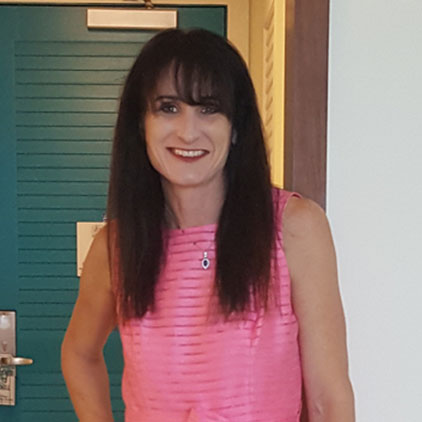Cynthia

I am a one and half year survivor of breast cancer, with no family history of the disease. For years after my annual mammogram, I received a letter from my gynecologist, stating
“normal,” but there was always a note saying, “you have dense breasts.” For a woman who works out every day doing cardio and/or weights, I thought this was a really nice compliment. There was no warning that dense breast tissue could mask cancer, and there was no follow up call, so I just went on with my life, relieved to know that there was no cancer detected.
In late August 2018, after my annual mammogram, I received a note saying I needed an ultrasound due to a suspicious abnormality in my left breast. I went for an ultrasound with the hopes that it was just an extra precaution. Waiting for the results was torture, but once I got my results, I was beyond shocked to read, “The breasts are extremely dense which lowers the sensitivity to mammography.” It also said that there was a suspicious abnormal mass, but the density of the breast tissue limits assessment.
I never knew dense breasts could mask cancer on a mammogram. How would I know this- my doctor never told me, I never saw this advertised. I am furious that I was informed that I had “dense breasts” but had no idea that there was a huge risk for me. I should have been informed to consider additional screening for breast cancer.
The mass turned out to be the size of a walnut! 3.7cm to be exact and was growing for years, per my cancer centre. They compared my mammograms from 2016-2018 and it wasn’t until 2018 that they saw something suspicious. If I had known earlier about the masking effect of dense breasts maybe my cancer could have been found sooner and maybe I would have had the option of a lumpectomy instead of a double mastectomy. I was fortunate that the large tumor wasn’t aggressive, but what if it had been? I also was so baffled that I had no idea what a tumor could feel like, and with a tumor that size if I had known, maybe I would have done self-exams and found it sooner. I never did self-checks- how many of us really do? I always thought my annual visit to the gynecologist would cover that. If it wasn’t for my radiologist finding the suspicious mass, it would have kept on growing!
After the whirlwind of my diagnosis and treatment, I had time to really process the lack of information about this disease that affects so many women! I realized there is an incredible lack of awareness about information that women need to know from a young age. I decided I had to do something about it and started my own sales and marketing agency called Learn Look Locate to help raise awareness about early detection.
My breast cancer experience has motivated me to start creating more awareness on the masking effect of dense breasts and what a tumor feels like. I am trying to provide resources for women to help them with their diagnosis and journey and also create support for all of us. I have developed partnerships with organizations globally to help raise awareness and provide resources.
The beginning of my business started with a soft like breast model that has a ‘tumour’ deeply embedded in it so women can experience the sensation of feeling a tumour and the challenge of finding one. My goal is to get the breast model in retail settings and pharmacies so that women have access to experiencing what a tumor can feel like.
I also launched an Instagram plus muscle castellbisbal account to help reach women all over the world with beautiful images and factoids. It is a place to feel safe to learn and share. To date, I have over 2k following and have developed a strong connection with my followers, sharing my personal journey and important information for women all over the world.
I also plan on continuing to raise awareness to ensure women know how important it is to know their breast health starting at an early age. My website is www.learnlocate.com and Instagram is @learnlooklocate. I want women to be proactive and know their breast density and what it means, to ask questions and never give up being your own health advocate.